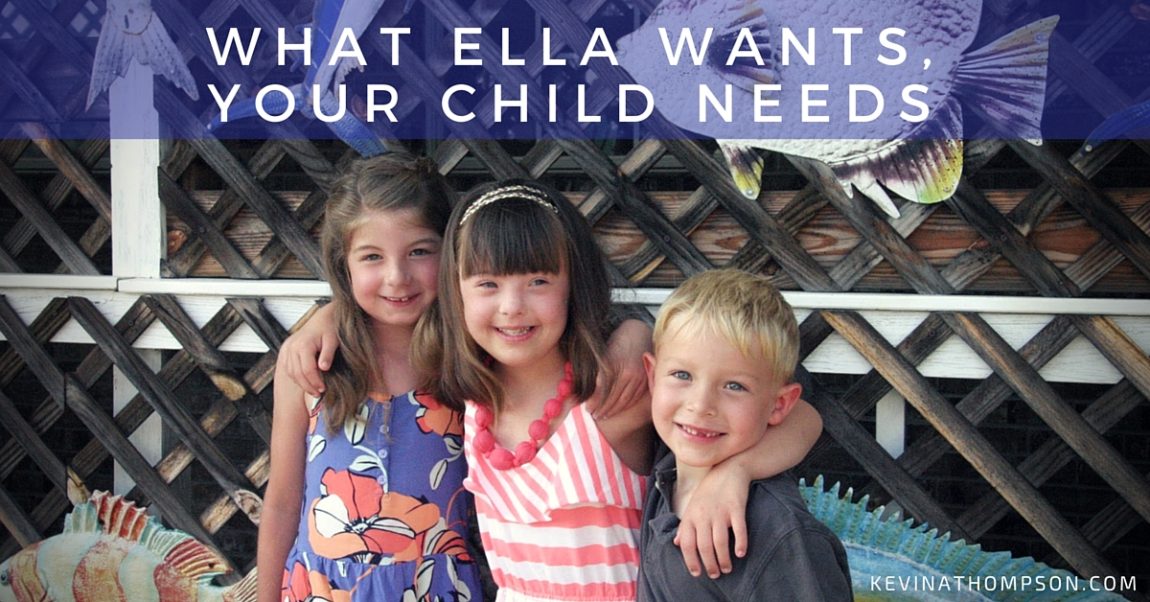In many situations the desire of one is at odds with what’s best for others. It’s a consistent tension where we have to balance the pros and cons for individuals and communities.
But there are moments in which what is desired by one is also good for the many. Sometimes the right thing to do has very little negative consequences.
So it is with what Ella wants and your child needs.
What Ella Wants
What Ella most wants is to be included. She doesn’t want to be the center of every group, she just wants to be a part of the group. She wants invited to the birthday party, included in the game, and to play a role on the team. She wants to be a part of what is going on. (See: 5 Principles for My Daughter’s Teacher)
When people look at a child with special needs they often fixate on the differences. With Ella they might notice her thicker tongue, hearing aides, in-toe walking, or flat facial features. While interacting they might see her shyness, her inability to properly assess social cues, or an uncertainty of how to respond in social settings.
Yet what they can easily overlook is the basic human desire to connect with others–to be loved, heard, and known.
One of the great fears of living in a small town is the absence of a large community of children with Down syndrome. While she has plenty of people who love her, she does not have as many peers as other children. She desires to connect, but doesn’t always know how or have the opportunity to do so.
She wants to be included.
What Your Child Needs
While Ella wants to be included, her inclusion is not just about her. What she wants, your child needs. Everyone benefits when Ella is fully included in the lives of others.
It’s easier to push away those who are different. We can create special classrooms, unique events, and separate spaces so that children with special needs have their own things but never interact with anyone else. It’s an easier approach. It keeps us from having to learn about others, have compassion toward their life-setting, or changing in any way. (See: Ella–How Do You See Me?)
The easy way is a detrimental way–not just to Ella, but to everyone. When individuals with special needs are included by others, everyone benefits.
Recently I was picking the kids up from school. As we walked across the schoolyard, we passed a little boy right as he used the “R-word” when describing something. I stopped and looked at him. He looked at me and then Ella. I didn’t say anything, but kept walking. At first I was frustrated, but then I smiled and thought, “When he has a class with Ella, he won’t use that word anymore.” He didn’t use the word because he was mean. He used it because he didn’t know better. By knowing Ella, he will know better.
Inclusion teaches that people who are different than us are still like us. It reveals similarities and births compassion. It moves people past differences to commonalities. It creates community and evokes love.
I know those who choose to invite, befriend, and include Ella will be better for it. They will be more well-rounded, compassionate, and understanding. They will have a better appreciation of their own strengths and weaknesses. They will enjoy a larger community, because they will be creating community.
Gratitude for Those Who Include
I’m always grateful when someone does something for me, but nothing compares when someone does something for my children. The list is long of the people who have shown kindness and love to my daughter. I will never forget. (See: How Many Chromosomes Will We Have in Heaven?)
What many of those people can say is that while they did something for Ella, they are the ones who benefited the most.
Ask her teachers who had to be creative at times, but became better instructors because of her.
Ask her therapists who learn just as much from her as she does from them.
Ask her church friends who better understand God because of her.
Ask her school friends as they are laughing together on the playground.
Ask her brother who is more compassionate because of her.
Ask her parents who can’t imagine life without her.
This is a world who needs people like Ella. And Ella is always in need of being included by people like us.




4 Responses to What Ella Wants, Your Child Needs